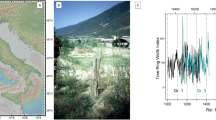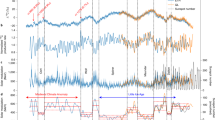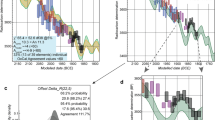Abstract
CARBON-14 dating has become of great importance and it is therefore necessary to determine the possible deviations between radiocarbon and actual ages. A radiocarbon age, given in radiocarbon years elapsed since the origin of the sample, is based on 14C decay and is calculated from the ratio of the present 14C activity of the sample to the 14C activity of the standard (95 per cent of the 14C activity of NBS oxalic acid). The standard 14C activity is assumed to be identical to the atmospheric 14C activity over the whole time interval over which 14C dating is used. Thus the conventional radiocarbon age does not allow for deviations in atmospheric 14C content during the past. As a result, radiocarbon years need not always be equal to solar years.
This is a preview of subscription content, access via your institution
Access options
Subscribe to this journal
Receive 51 print issues and online access
$199.00 per year
only $3.90 per issue
Buy this article
- Purchase on Springer Link
- Instant access to full article PDF
Prices may be subject to local taxes which are calculated during checkout
Similar content being viewed by others
References
Stuiver, M., in symposium held December 1969 at Yale University in honour of R. F. Flint (in the press).
Fergusson, C. W., Science, 159, 839 (1958).
Stuiver, M., J. Geophys. Res., 66, 273 (1961).
Stuiver, M., Science, 149, 533 (1965).
Lingenfelter, R. E., Rev. Geophys., 1, 35 (1963).
Suess, H. E., J. Geophys. Res., 70, 5937 (1965).
Grey, D. C., J. Geophys. Res., 74, 6333 (1969).
Suess, H. E., in Radiocarbon Variations and Absolute Chronology (Twelfth Nobel Symposium) (edit. by Olsson, I. U.) (Wiley, New York, 1970).
Damon, P. E., in Radiocarbon Variations and Absolute Chronology (Twelfth Nobel Symposium) (edit. by Olsson, I. U.) (Wiley, New York, 1970).
Michael, H. N., and Ralph, E. K., in Radiocarbon Variations and Absolute Chronology (Twelfth Nobel Symposium) (edit. by Olsson, I. U.) (Wiley, New York, 1970).
Fromm, E., Geol. For. Stockh. Forh., 60, 365 (1938).
Wenner, C. G., Stockh. Cont. Geol., 18 (3) 75 (1968).
Tauber, H., in Radiocarbon Variations and Absolute Chronology (Twelfth-Nobel Symposium) (edit. by Olsson, I. U.) (Wiley, New York, 1970).
Stuiver, M., in Radiocarbon Variations and Absolute Chronology (Twelfth Nobel Symposium) (edit. by Olsson, I. U.), 197 (Wiley, New York,1970).
Vogel, J. C., Casparie, W. A., and Munaut, A. V., Science, 166, 1143 (1969).
Stuiver, M., Proceedings Radioactive Dating and Methods of Low-level Counting, 27 (IAEA, STI/Pub/152, Vienna, 1967).
Nillson, E., K. Svenska Vetensk. Akad. Handl., Ser. 4, 12 (1) 1 (1968).
Mörner, N. A., in Radiocarbon Variations and Absolute Chronology (Twelfth Nobel Symposium (edit. by Olsson, I. U.) (Wiley, New York, 1970).
Author information
Authors and Affiliations
Rights and permissions
About this article
Cite this article
STUIVER, M. Tree Ring, Varve and Carbon-14 Chronologies. Nature 228, 454–455 (1970). https://doi.org/10.1038/228454a0
Received:
Revised:
Issue Date:
DOI: https://doi.org/10.1038/228454a0
This article is cited by
-
High points in paleolimnological studies as viewed by a convert
Journal of Paleolimnology (2010)
-
Radiocarbon timescale tested against magnetic and other dating methods
Nature (1978)
-
Irregularities in dendrochronological calibration
Nature (1974)
-
Spread of Spruce (Picea abies (L.) Karst) in Fennoscandia and Possible Climatic Implications
Nature (1972)
Comments
By submitting a comment you agree to abide by our Terms and Community Guidelines. If you find something abusive or that does not comply with our terms or guidelines please flag it as inappropriate.



